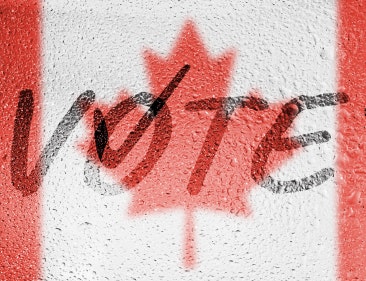
Blog
- Employer advice
Home
Resources
Employer advice

Charlie Herrera Vacaflor, Employment Law & HR Content Senior Consultant
(Last updated )

Charlie Herrera Vacaflor, Employment Law & HR Content Senior Consultant
(Last updated )
Jump to section:
On April 28, 2025, Canada will hold its 45th federal election. All Canadians who are eligible to vote can cast their ballot at polling stations across the country. This blog answers common questions Canadian employers may have about their obligations to employees on voting day.
To vote in the Canadian federal election 2025, you must:
The voting hours at polling stations for each time zone across Canada are:
Newfoundland Time: 8:30 a.m.–8:30 p.m.
Atlantic Time: 8:30 a.m.–8:30 p.m.
Eastern Time: 9:30 a.m.–9:30 p.m.
Central Time*: 8:30 a.m.–8:30 p.m.
Mountain Time*: 7:30 a.m.–7:30 p.m.
Pacific Time: 7:00 a.m.–7:00 p.m.
*In Saskatchewan, voting hours are from 7:30 a.m. to 7:30 p.m. for the 2025 Canadian federal election.
Under the Canada Elections Act, all employees who are eligible to vote must receive three consecutive paid hours during polling hours (9:00 AM to 9:30 PM local time) to vote (Canada Elections Act – CEA, s.132(1).
Employers who violate the Canada Elections Act by not providing paid time off or deduct employee pay for taking time off for voting during work hours could face fines of up to $2,000, imprisonment for up to three months, or both.
Employers have the right to decide when employees can take time off to vote. So, the time off for voting can be scheduled at the employer’s convenience.
For example, if an employee works in Halifax (Atlantic Time Zone) from 10:00 am to 7:00 pm, their work schedule overlaps with the 8:30 am to 8:30 pm voting hours. But it does not provide three consecutive hours to vote. Therefore, the employer is legally required to provide paid time off.
In this case, the employer could allow the employee to arrive 1.5 hours late or leave 1.5 hours early, or a combination thereof, to create a continuous three-hour voting window within the polling hours.
But if the hours of employment of an employee are 8AM to 4PM, and the polls are open from 8:30 am to 8:30 pm, such employee would have 3-consecutive hours after work to vote. In this case, the employer is not obligated to accommodate the employee with time off to vote on election day.
Some HR considerations to review include:
Prohibition of interference: The Canada Elections Act prohibits employers from using intimidation, undue influence, or any other means to interfere with an employee’s ability to exercise their three consecutive hours for voting (Canada Elections Act, s. 134).
Employers must be transparent and communicate voting rights clearly. Where needed, employers may have to adjust work schedules to accommodate voting time without penalizing staff or deducting wages.
No penalty or reduction of wages: An employer obligated to provide voting time off is prohibited from making any deduction from an employee’s pay. They can also not impose any other form of penalty for the time taken to vote (Canada Elections Act, s. 133(1).
Regardless of their pay structure (salary, hourly, piece work), employees must receive their regular day’s pay. Hourly or piece-work employees must be paid for the hours they would have normally worked, even if they are at the polls.
To accommodate last-minute requests, employers must balance multiple schedule modifications while running operations. A HR best practice is to create a pre-election scheduling template. This would help employers identify potential clashes and overlaps and plan alternative coverage plans.
No. Employers cannot mandate how employees choose to cast their ballot. Canadian employers must still provide three (3) consecutive hours for employees to vote during polling hours, regardless of alternative voting methods being available.
Implementing such a mandate could be regarded as an intimidation against an employee’s right to vote, which would lead to fines, possible imprisonment, or both for deliberately hindering staff from voting however they choose.
Peninsula can help. Our experts can answer all your questions, assist you in developing company policies and with any other HR, health & safety, or employment law advice you may need. To learn more about how our services can benefit your business, call us today at 1 (833) 247-3652.
Home
Resources
Employer advice
